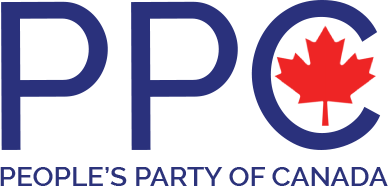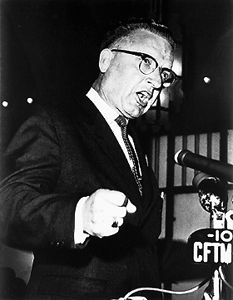The People’s Party of Canada (PPC) is a far-right political party. It was founded in September 2018 by Maxime Bernier a month after he left the Conservative Party. It was officially recognized by Elections Canada in January 2019. The party opposes government intervention in society, culture and the economy. It is critical of multiculturalism and government policies to fight climate change. Bernier represented Beauce, Quebec, and was the PPC’s only Member of Parliament (MP). However, he lost his seat in the 2019 election, when the party received only 1.6 per cent of the national vote. The PPC rebounded in 2021, when it leapt to 4.9 per cent by siphoning votes from the Conservatives. But the PPC’s vote share plummeted to less than one per cent in the 2025 election.

Party Platform
Maxime Bernier has said that he drew 90 per cent of the PPC’s platform from Canada’s populist and conservative Reform Party (1987–2000). The PPC has been described as libertarian and promotes “small” government and freedom from censorship. PPC free-market goals include an expanded oil and gas industry and removal of trade barriers between provinces. If elected, the PPC vows to withdraw Canada from the Paris Accord and scrap the federal carbon tax, stating there is “no scientific consensus” that carbon emissions caused by human activity cause global warming. The PPC also wants to repeal Canada’s Multiculturalism Act (see Multiculturalism), cut immigration levels by half and restrict the influx of refugees.
The party has been linked to white supremacists and the far right. Its founding members, for example, included associates of anti-immigrant organizations Pegida Canada and the Soldiers of Odin. Party rallies and Bernier’s campaign appearances have drawn vocal protests and, in some cases, violent clashes between supporters and anti-fascist demonstrators.
2021 Federal Election
During the 2021 election, Maxime Bernier and the PPC notably campaigned against government policies related to the COVID-19 pandemic. The party managed to increase its vote share substantially from 1.6 per cent in 2019 to 4.9 per cent in 2021. Bernier failed to win re-election in Beauce. He was again defeated by Richard Lehoux, but by a much larger margin of more than 17,000 votes. However, the PPC succeeded in siphoning support from the Conservative Party, especially in Western Canada, where Bernier spent the majority of the campaign.
In December 2021, Bernier’s leadership of the PPC was confirmed by a vote of 95.6 per cent support from the party membership.
2025 Federal Election
Canada’s political deck of cards was reshuffled significantly in early 2025. Newly inaugurated US president Donald Trump began his second term by threatening a trade war with Canada with the stated goal of annexing it as the 51st state. Nationalism in Canada soared, and concerns over the country’s sovereignty grew.
As a result, the election on 28 April 2025 proved to be a two-way race. The Liberals and Conservatives combined for 85 per cent of the vote. The smaller parties were all squeezed out, including the PPC, which received only 0.7 per cent of the national vote. Bernier, who did not participate in the televised leaders’ debates because the PPC did not meet the participation requirements, finished a distant fourth in Beauce with only 5.8 per cent of the vote.
After the election, Bernier told CBC News, “The People's Party will be there at the next election — in two years or four years — with the same ideas and the same platform. When Canadians will be ready, we will be there.”

 Share on Facebook
Share on Facebook Share on X
Share on X Share by Email
Share by Email Share on Google Classroom
Share on Google Classroom



